The Biden administration on Thursday unveiled its new Reconnecting Communities pilot program, an effort that aims — as its name suggests — to “reconnect communities that were previously cut off from economic opportunities by transportation infrastructure,” per a statement.
The program, which will be administered through the Department of Transportation, will award $195 million in grants this year, $50 million of which will be reserved for communities still in the planning stages of their transportation connectivity projects. In total, the program will allocate $1 billion for plans and projects over the course of the next five years.
"Transportation can connect us to jobs, services, and loved ones, but we've also seen countless cases around the country where a piece of infrastructure cuts off a neighborhood or a community because of how it was built," transportation secretary Pete Buttigieg wrote in a statement. "Using funds from President Biden's Bipartisan Infrastructure Law, we are proud to announce the launch of Reconnecting Communities: the first-ever dedicated federal initiative to unify neighborhoods living with the impacts of past infrastructure choices that divided them."
Buttigieg joined Rep. Terri Sewell, D-Ala., and other local leaders in Birmingham, Alabama, on Thursday to preview the program and to highlight the city’s upcoming rapid transit service Birmingham Xpress, which will connect over two dozen communities in the state to jobs, schools and healthcare.
Birmingham Xpress will connect 25 neighborhoods that are "bifurcated by a number of highways," officials said, making transportation all the more difficult for city residents.
Sewell shared a series of tweets showcasing the secretary's visit to Birmingham, writing the new rapid transit service is a "great example of a program that is helping to connect our communities."
"This is about ensuring that people can live where they want to live more affordably while accessing the jobs, schools, & services our city has to offer!" Sewell added.
Close to half of Birmingham’s population lives within one-half mile of planned stations along the new 15-mile bus corridor. City leaders say that will open up access around I-65, which cuts through the city’s Black neighborhoods, providing connections to jobs in the corridor as well as the University of Alabama at Birmingham and other schools.
“Transportation can connect us to jobs, services and loved ones, but we’ve also seen countless cases around the country where a piece of infrastructure cuts off a neighborhood or a community because of how it was built,” Buttigieg said during Thursday's visit.
“We can’t ignore the basic truth: that some of the planners and politicians behind those projects built them directly through the heart of vibrant populated communities,” he added. “Sometimes as an effort to reinforce segregation. Sometimes because the people there have less power to resist. And sometimes as part of a direct effort to replace or eliminate Black neighborhoods.”
The Reconnecting Communities funds will be made available for a wide variety of infrastructure projects that are ready to launch. Those so-called Capital Construction Grants will help “carry out a project to remove, retrofit, mitigate, or replace an existing eligible facility with a new facility that reconnects communities,” DOT wrote in a release. The minimum request threshold for a construction grant will be $5 million.
“These projects can take a lot of different forms,” Buttigieg told reporters. “It could mean constructing a public greenway that allows people to walk, bike and access public transit, [like] in St. Louis. It can mean connecting parts of the city that were disconnected through a new asset like the bus rapid transit line.
“What all these different projects or visions have in common is empowering communities to innovate and prepare for the future,” he added. “They provide people with better opportunities, better connections to jobs, and they let people live in safer and healthier, thriving places.”
The maximum amount available for planning grants under the program will be $2 million, officials noted, adding those programs can “entail anything from community engagement and visioning to studies that can look at traffic patterns to documenting local history and environmental and transportation and justices in communities where the planning work and community engagement has been completed.”
Among the application criteria will be a focus on equity and environmental justice, which “speaks to the extent that the applicant has robust community engagement and a plan or assessment of the harm or inequities,” officials said in part.
Officials will also assess mobility and community connectivity, community-based stewardship and the potential for equitable development and shared prosperity.
Applications for the grants must be submitted by 11:59 p.m. EDT on Oct. 13, 2022.
The Associated Press contributed to this report.



